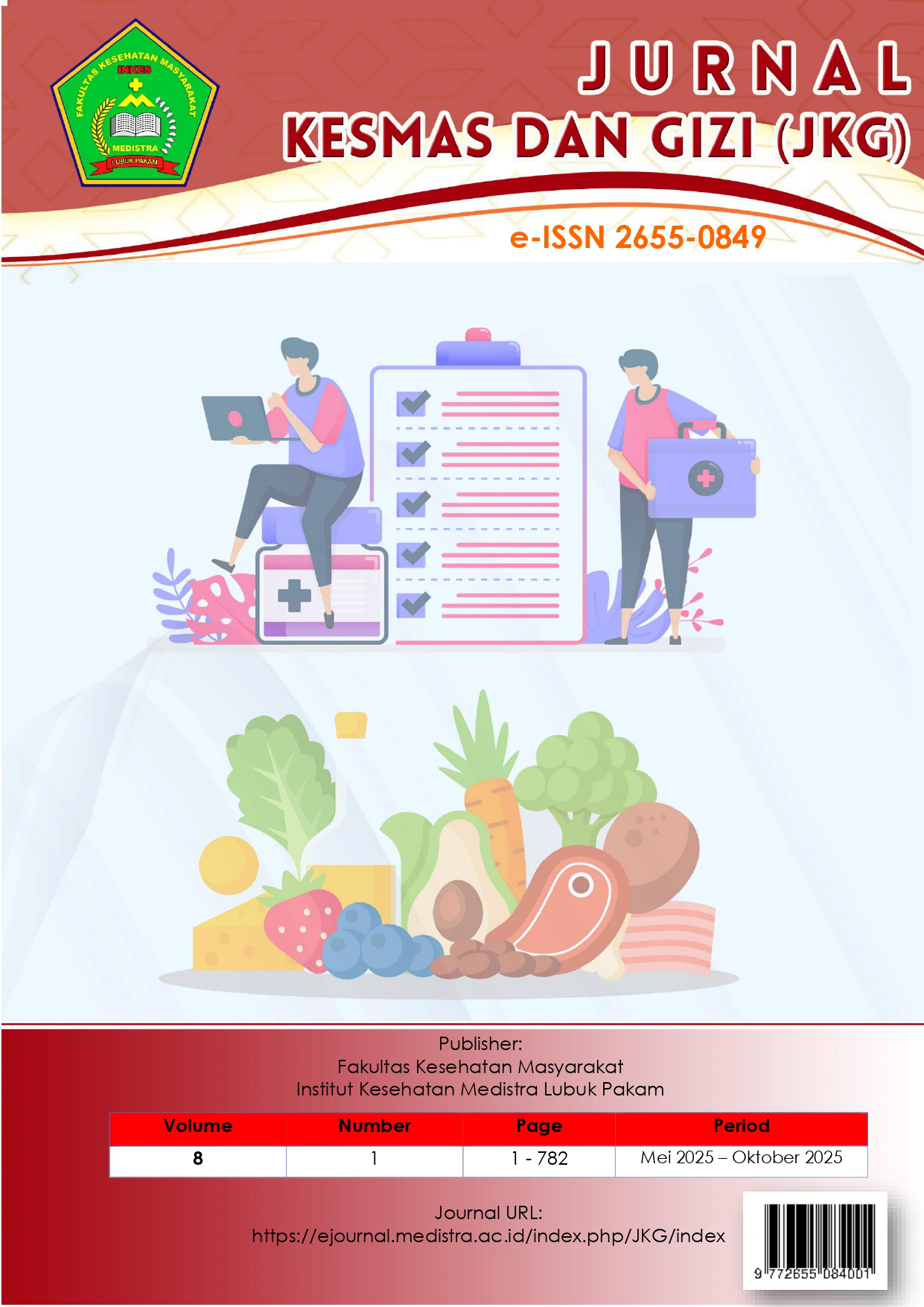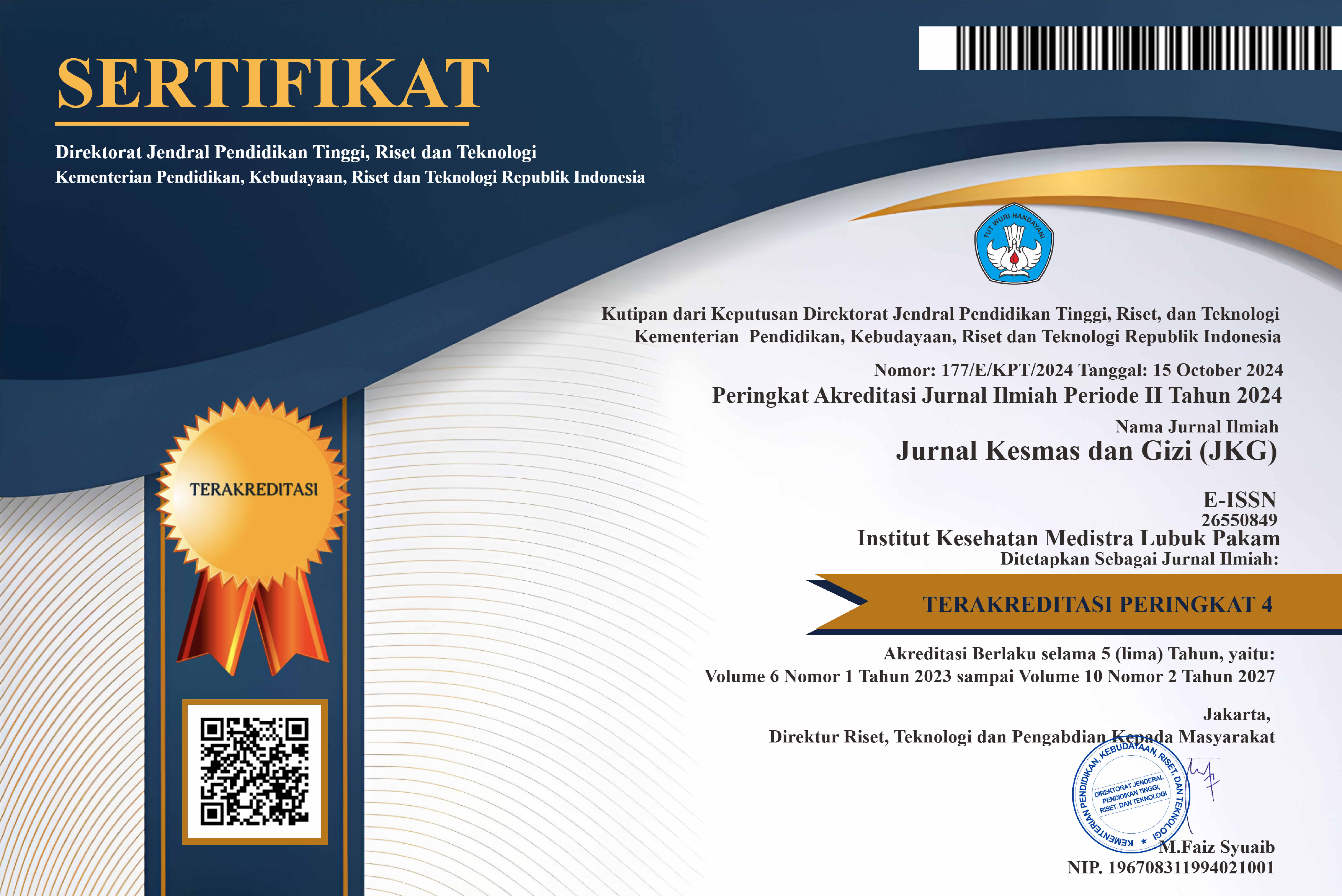The analysis of the factors influencing the awareness of post-operative neurosurgery patients in the ICU of a hospital
DOI:
https://doi.org/10.35451/p371wr57Keywords:
Work Motivation, Workload, Caring Behavior, Service QualityAbstract
Background: Nurses' caring behavior significantly affects the quality of service and patient satisfaction. However, in Indonesia, the quality of nurses' caring behavior is still relatively low. High workloads and low work motivation can affect the quality of nurses' caring behavior. This study aims to analyze the relationship between work motivation and workload on nurses' caring behavior at Puskesmas Tigalingga in 2025.Objective: This study aims to determine the relationship between work motivation and workload on nurses' caring behavior at Puskesmas Tigalingga in 2025. Research Method: This study uses a quantitative design with a non-experimental descriptive correlation approach. The study was conducted at Puskesmas Tigalingga with a population of 57 nurses and midwives. The sampling technique used was Total Sampling. Data were collected using questionnaires and analyzed using Chi-Square tests and multiple logistic regression. Results: The results of the study indicate a significant relationship between work motivation and caring behavior (p-value = 0.003), as well as between workload and caring behavior (p-value = 0.003). Logistic regression analysis showed that workload has the greatest impact on caring behavior, with an Odds Ratio (OR) = 12.49. Conclusion: Managing workload effectively and increasing work motivation are crucial for improving nurses' caring behavior. Both factors play an important role in improving the quality of nursing services and patient satisfaction at Puskesmas Tigalingga.
Downloads
References
[1] Mailani, D., & Fitri, E. (2017). Hubungan motivasi kerja perawat dengan perilaku caring perawat di rumah sakit. Jurnal Keperawatan, 13(3), 45-53.
[2] Rizkianti, F. (2020). Faktor-faktor yang memengaruhi perilaku caring perawat di rumah sakit. International Journal of Nursing and Health, 12(1), 22-30.
[3] Mulyadi, A., & Katuuk, F. (2017). Pengaruh motivasi kerja terhadap perilaku caring perawat di RSUD Jombang. Jurnal Ilmu Kesehatan, 22(4), 67-75.
[4] Herman, E. (2021). Dampak beban kerja terhadap stres dan kinerja perawat. Jurnal Praktik Keperawatan, 35(2), 123-130.
[5] Astuti, S., dkk. (2020). Pengaruh keterbatasan sumber daya manusia terhadap kualitas pelayanan keperawatan di rumah sakit. Jurnal Pelayanan Kesehatan Indonesia, 19(5), 45-52.
[6] Puspita, I., & Hidayah, N. (2019). Hubungan motivasi kerja dengan perilaku caring perawat di rumah sakit. Jurnal Keperawatan, 5(2), 123-128
[7] Tusnia, P., Prianti, I., & Satus, S. (2017). The influence of workload on caring behavior of nurses in BRSUD Subang. Journal of Nursing Care, 23(2), 124-130.
[8] Chusnawiyah, S. (2015). Beban kerja dan dampaknya terhadap perilaku perawat serta kepuasan pasien. Jurnal Kualitas Pelayanan Kesehatan, 18(4), 45-50.
[9] Madadzadeh, S. A., et al. (2018). Dampak beban kerja terhadap kinerja perawat dan perilaku caring di rumah sakit. Jurnal Manajemen Keperawatan, 26(1), 51-58.
[10] Geyer, M., et al. (2018). Hubungan antara stres dan kinerja pekerja kesehatan. International Journal of Stress Management, 24(3), 211-224.
[11] Puspita, I., & Hidayah, N. (2018). Hubungan motivasi kerja perawat dengan perilaku caring perawat di rumah sakit.
[12] Marquis, B. L., & Huston, C. J. (2017). Leadership roles and management functions in nursing: Theory and application (7th ed.). Philadelphia: Saunders.
[13] Alligood, M. R. (2018). Nursing theory: Utilization & application (5th ed.). St. Louis: Elsevier.
[14] Madadzadeh, S. A., et al. (2020). The impact of workload on nursing performance and caring behavior in hospitals. Journal of Nursing Management, 26(1), 51-58.
[15] Geyer, M., et al. (2018). The relationship between stress and performance in healthcare workers. International Journal of Stress Management, 24(3), 211-224.
[16] Manumba, A. (2001). The effects of workload on nursing performance and stress. Journal of Healthcare Quality, 18(4), 45-50.
[17] Watson, J., & Brewer, B. (2015). Caring science: A theory for transformation in nursing practice. Journal of Clinical Nursing, 24(5), 726-734.
[18] Tusnia, P., Prianti, I., & Satus, S. (2017). The influence of workload on caring behavior of nurses in BRSUD Subang. Journal of Nursing Care, 23(2), 124-130.
[19] Chusnawiyah, S. (2015). The impact of workload on nurses’ behavior and patient satisfaction. Journal of Healthcare Quality, 18(4), 45-50.
[20] Madadzadeh, S. A., et al. (2017). The impact of workload on nursing performance and caring behavior in hospitals. Journal of Nursing Management, 26(1), 51-58.
[21] Geyer, M., et al. (2018). The relationship between stress and performance in healthcare workers. International Journal of Stress Management, 24(3), 211-224.
[22] Maharani, R. (2019). Effects of workload on nurse performance and stress: A study in a public health setting. Journal of Nursing and Health Studies, 5(2), 88-94.
Downloads
Published
Issue
Section
License
Copyright (c) 2025 Julyenni Karo-Karo, Barita Aritonang, Desideria Yosepha Ginting

This work is licensed under a Creative Commons Attribution 4.0 International License.
Copyright in each article is the property of the Author.



























